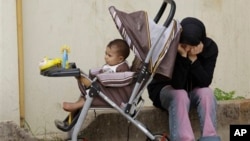BEKAA VALLEY, LEBANON —
Sixty-eight-year-old Motija tried for weeks to escape the bombs and bullets of the Syrian civil war. Like a million other Syrians, she eventually left her wrecked Damascus suburb for neighboring Lebanon, where she lives with nine relatives in a crowed three-room house.
Her situation isn't unusual. Fifty other Syrian refugee families inhabit the small Bekaa Valley village near the northeastern border town of Hermel, a largely Shia Muslim community along the Orontes river.
While local Lebanese have accommodated the refugees as the best they can, Haider, a village elder, calls them a burden.
“It is a financial strain for us because it is a small community and it is also considered a pure community," he says via interpreter. "Because most of the community here live as farmers and peasants, it is not easy for us to provide all this aid for refugee families.”
Wary of United Nations requests to build refugee camps, Lebanese authorities have allowed the Syrians to spread across the country’s 1,400 municipalities. While those who can pay to shelter themselves are targeting the more impoverished towns and villages where housing costs are cheaper, the trend is posing problems for some already-struggling locals.
Now anger is mounting as locals compete with Syrians for scarce jobs and housing, and there have been reports of violence.
Aiming to stem growing Lebanese resentment, the U.N. Refugee Agency is assisting towns and villages with housing and public infrastructure development. The so-called "quick-impact" projects, says UNHCR spokesperson Dana Sleiman, include aiding the construction of new waste management plants and libraries, along with local housing stock.
“We are trying to look at creative solutions, trying to help the hosting communities at the same time by renovating unfinished houses of Lebanese families and in return they would host Syrian families," says Sleiman, explaining that the agency's June 2013 funding appeal asked donors to focus on both refugee and host communities.
Of the $1.2 billion U.N. officials have requested for aid efforts in Lebanon, she says, more than $400 million is earmarked for infrastructure and security.
"This solution has been working but we are also looking at renovating collective shelters, abandoned structures," she says.
With the refugee crisis growing in scale, and donor countries already digging deep, the challenge is enormous.
Her situation isn't unusual. Fifty other Syrian refugee families inhabit the small Bekaa Valley village near the northeastern border town of Hermel, a largely Shia Muslim community along the Orontes river.
While local Lebanese have accommodated the refugees as the best they can, Haider, a village elder, calls them a burden.
“It is a financial strain for us because it is a small community and it is also considered a pure community," he says via interpreter. "Because most of the community here live as farmers and peasants, it is not easy for us to provide all this aid for refugee families.”
Wary of United Nations requests to build refugee camps, Lebanese authorities have allowed the Syrians to spread across the country’s 1,400 municipalities. While those who can pay to shelter themselves are targeting the more impoverished towns and villages where housing costs are cheaper, the trend is posing problems for some already-struggling locals.
Now anger is mounting as locals compete with Syrians for scarce jobs and housing, and there have been reports of violence.
Aiming to stem growing Lebanese resentment, the U.N. Refugee Agency is assisting towns and villages with housing and public infrastructure development. The so-called "quick-impact" projects, says UNHCR spokesperson Dana Sleiman, include aiding the construction of new waste management plants and libraries, along with local housing stock.
“We are trying to look at creative solutions, trying to help the hosting communities at the same time by renovating unfinished houses of Lebanese families and in return they would host Syrian families," says Sleiman, explaining that the agency's June 2013 funding appeal asked donors to focus on both refugee and host communities.
Of the $1.2 billion U.N. officials have requested for aid efforts in Lebanon, she says, more than $400 million is earmarked for infrastructure and security.
"This solution has been working but we are also looking at renovating collective shelters, abandoned structures," she says.
With the refugee crisis growing in scale, and donor countries already digging deep, the challenge is enormous.




